This article was originally published by Tyler Durden at ZeroHedge.
In a nationwide address that was delayed from its prime-time Tuesday delivery and ahead of votes in four Ukraine regions to join Russia, on Wednesday morning Russian President Vladimir Putin announced a partial military mobilization while vowing to use all means necessary to defend Russia and pledged to annex the territories already occupied by Russia, raising the stakes in the seven-month-old conflict.
Calling the moves “urgent, necessary steps to defend the sovereignty, security and territorial integrity of Russia,” Putin said that Russia is fighting the full might of NATO. The US and its allies, he said, are seeking to “destroy” Russia.
The partial mobilization means that reservists will be drafted into military service, Putin said, starting immediately. The Armed Forces will draw on military reservists only, and those who have completed national service, the president said promising that they will be provided with additional training along with all the benefits due to people involved in active duty.
The measure is “sensible and necessary” under the circumstances, Putin stated, adding that he has already signed an order for the call-up to start immediately.
In his speech, Putin accused Kiev of backing away from peace talks, acting on direct orders from its Western allies. Instead of negotiating, the Ukrainian government has beefed up its military with NATO-trained troops, many of whom are neo-Nazi extremists, he said.
Putin also accused the west of using “nuclear blackmail” against Russia noting that “if its territorial integrity is threatened Russia will definitely use all the means at its disposal.” to defend Russian territory. “This is not a bluff.”
Russian forces sent to Ukraine in February have secured a large portion of territory claimed by the Donetsk and Lugansk People’s Republics as well as parts of Ukraine, and the resulting frontline stretches over 1,000km, according to the Russian president.
Putin also commented on the upcoming referendums in the two Donbass republics and two regions of Ukraine currently controlled to a large extent by Russian troops. The territories which include Luhansk, Donetsk, Kherson, and Zaporizhzhia provinces, have announced plebiscites on whether become part of Russia, with the ballots scheduled to start on Friday. Putin said his government will respect the outcome of the four referendums, and provide security for the voting process.
Some other notable highlights from Putin’s address:
- the contracts for reserves last “until the end of the partial mobilization period” i.e. indefinitely
- governors of Russian regions decide who and how many people get sent to the front
Putin’s full decree on mobilization can be found on the Kremlin website although it is blocked for most western browsers. It says mobilized Russians will be treated the same as contract troops. The criteria for exemption are age, health, being in jail, and working in the armaments industry. Details from the (google-translated) decree below:
In accordance with the federal laws of May 31, 1996 No. 61-FZ “On Defense”, of February 26, 1997 No. 31-FZ “On mobilization training and mobilization in the Russian Federation” and of March 28, 1998 No. 53- Federal Law “On military duty and military service” I decide:
1. To announce partial mobilization in the Russian Federation from September 21, 2022.
2. To carry out the call of citizens of the Russian Federation for military service for mobilization in the Armed Forces of the Russian Federation. Citizens of the Russian Federation called up for military service by mobilization have the status of military personnel serving in the Armed Forces of the Russian Federation under a contract.
3. Establish that the level of pay for citizens of the Russian Federation called up for military service by mobilization into the Armed Forces of the Russian Federation corresponds to the level of pay for military personnel serving in the Armed Forces of the Russian Federation under a contract.
4. Contracts for the passage of military service concluded by military personnel continue to be valid until the end of the period of partial mobilization, with the exception of cases of dismissal of military personnel from military service on the grounds established by this Decree.
5. Establish during the period of partial mobilization the following grounds for the dismissal from military service of servicemen undergoing military service under a contract, as well as citizens of the Russian Federation called up for military service for mobilization in the Armed Forces of the Russian Federation:
a) by age – upon reaching the age limit for military service;
b) for health reasons – in connection with their recognition by the military medical commission as unfit for military service, with the exception of military personnel who have expressed a desire to continue military service in military positions that can be replaced by the specified military personnel;
c) in connection with the entry into force of a court verdict on the imposition of a sentence of imprisonment.
6. To the Government of the Russian Federation:
a) to finance activities for partial mobilization;
b) take the necessary measures to meet the needs of the Armed Forces of the Russian Federation, other troops, military formations and bodies during the period of partial mobilization.
8. The highest officials of the constituent entities of the Russian Federation shall ensure the conscription of citizens for military service for mobilization in the Armed Forces of the Russian Federation in the number and within the time limits determined by the Ministry of Defense of the Russian Federation for each constituent entity of the Russian Federation.
9. Provide citizens of the Russian Federation working in organizations of the military-industrial complex with the right to deferment from conscription for military service for mobilization (for the period of work in these organizations). The categories of citizens of the Russian Federation who are granted the right to deferment and the procedure for granting it are determined by the Government of the Russian Federation.
10. This Decree comes into force from the day of its official publication.
Following Putin’s address, Russia’s minister of defense Sergei Shoigu also delivered a nationwide TV address, in which he said that the battlefield conditions in Ukraine as “difficult.”
“We are not fighting with Ukraine, but with the collective west ” he said, noting mobilization will be gradual, not one-time. He also added more nuclear threats: “All types of arms, including the nuclear triad, are fulfilling their tasks.”
Some more highlights from Shoigu’s address:
- Calling up the reserves adds about 300,000 men to Russia’s forces
- “These are not people who’ve never seen or heard anything about the army.”
- Students are exempt and “only 1% of mobilization potential” will be used
Following the partial mobilization announcement, oil and gold surged…
… futures tumbled…
…the Bloomberg dollar index soared to a new record high…
…yields dropped…
… and the EUR tumbled even further below parity.
And now we await the Fed.

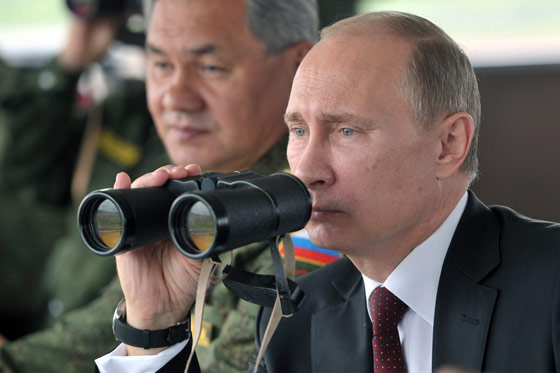
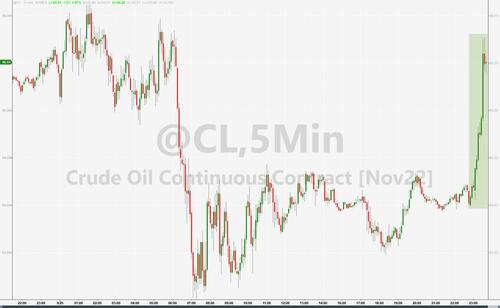

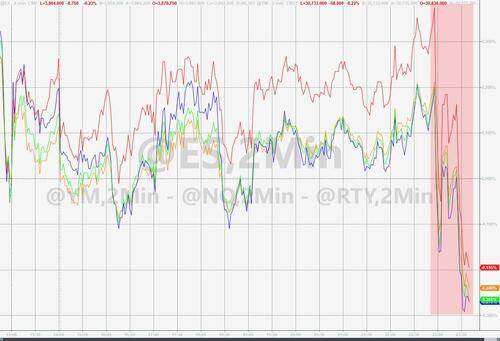
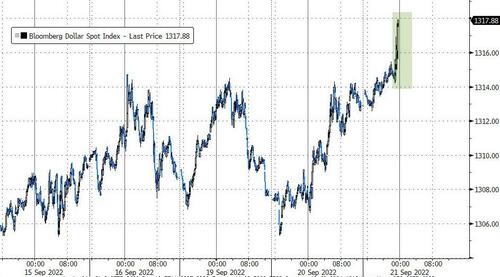
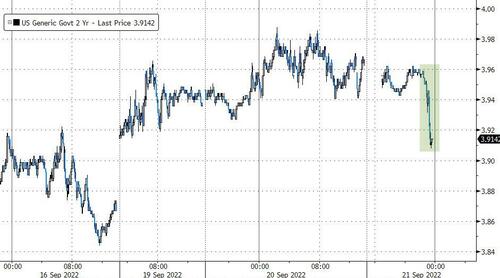
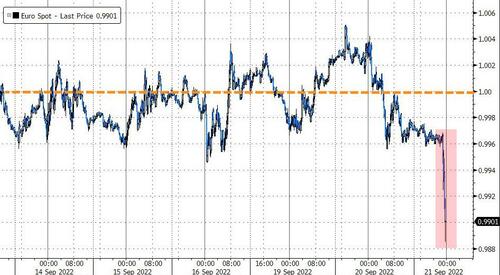


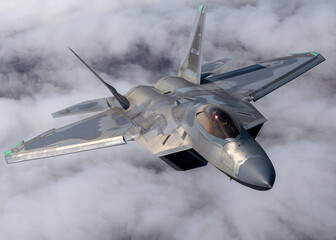





0 Comments